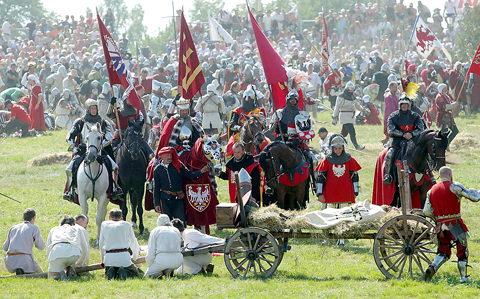Thousands of fans of the Middle Ages on Saturday donned their tabards and lowered their visors to relive the heady days of 1410, when a Polish-Lithuanian army smashed the Teutonic Knights.
On the real site of the Battle of Grunwald, some 2,200 re-enactors clashed head on as they marked the 600th anniversary of what is seen as a tide-turning moment in the region’s history.
Battling in stifling heat, the knights, archers, cavalry and halberd-wielding footmen were watched by what police said was a crowd of up to 200,000.

PHOTO: EPA
Grunwald, in northern Poland, is a magnet for fans of all things medieval, who flock here every July to don itchy flax clothes, codpieces and chainmail, quaff mead, and enjoy a good ruck.
The battle is serious stuff. Although the knights’ swords are blunted, they barely pull their blows in a full-throttle skirmish.
“I got this in training [on Friday],” a knight named Janek said, pointing to a plaster cast on his left arm which was just visible under his armor.
“But it didn’t stop me getting stuck right in again [on Saturday],” he added, grinning as he lurched to his feet with a clunk of metal.
Serious injuries are relatively rare, with dehydration and heat-stroke a greater worry, participants said.
The battlefield rang out to the sound of bombards — early cannons — whose blast and acrid black-powder smoke failed to faze the horses of a charging unit of lancers.
Nearby, Monika Iwanska, 17, carried a wooden bucket of water to a group of slumped knights. The only concession to modernity was a clutch of drinking straws — supping water through a visor is not exactly simple.
“It’s my first time here,” Iwanska said. “I got into this because my boyfriend’s a knight.”
“The atmosphere’s really great. But it’s about more than that, because I really like the Middle Ages and you learn [a] lot about the past by living it for real,” she added.
Tomasz Konopka, commander of a “banner,” or medieval military unit, kept staunchly in character, haranguing his troops.
“Form up! You call that a line?” he yelled, whacking an errant knight with the flat of his sword.
The original battle on July 15, 1410, helped speed the decline of the mainly-German Order of the Teutonic Knights, warrior-monks who wielded power along the Baltic coast from the 13th century.
Victory fueled the rise of a powerful Polish-Lithuanian united state which lasted four centuries, and the battle enjoys iconic status in both nations today.
Jaroslaw Struczynski, who acts as the Teutonic Knights’ Grand Master Ulrich von Jungingen, was booed by the crowd as he rode sneering onto the field.
“I figured someone had to play him,” Struczynski said ahead of the battle.
Von Jungingen died in the battle, so Struczynski, one of the founders of the re-enactment, has had to hit the deck more than a dozen times.
What started as a low-key gathering of Polish Grunwald fans in the early 1990s has spiraled into an ultra-authentic event which organizers say is Europe’s largest knightly re-enactment.
Along with participants playing peasant levies and camp-followers — who take the total number to 6,000 — the knights spend a week camping out living history-style.

BACKLASH: The National Party quit its decades-long partnership with the Liberal Party after their election loss to center-left Labor, which won a historic third term Australia’s National Party has split from its conservative coalition partner of more than 60 years, the Liberal Party, citing policy differences over renewable energy and after a resounding loss at a national election this month. “Its time to have a break,” Nationals leader David Littleproud told reporters yesterday. The split shows the pressure on Australia’s conservative parties after Prime Minister Anthony Albanese’s center-left Labor party won a historic second term in the May 3 election, powered by a voter backlash against US President Donald Trump’s policies. Under the long-standing partnership in state and federal politics, the Liberal and National coalition had shared power

A Croatian town has come up with a novel solution to solve the issue of working parents when there are no public childcare spaces available: pay grandparents to do it. Samobor, near the capital, Zagreb, has become the first in the country to run a “Grandmother-Grandfather Service,” which pays 360 euros (US$400) a month per child. The scheme allows grandparents to top up their pension, but the authorities also hope it will boost family ties and tackle social isolation as the population ages. “The benefits are multiple,” Samobor Mayor Petra Skrobot told reporters. “Pensions are rather low and for parents it is sometimes

CONTROVERSY: During the performance of Israel’s entrant Yuval Raphael’s song ‘New Day Will Rise,’ loud whistles were heard and two people tried to get on stage Austria’s JJ yesterday won the Eurovision Song Contest, with his operatic song Wasted Love triumphing at the world’s biggest live music television event. After votes from national juries around Europe and viewers from across the continent and beyond, JJ gave Austria its first victory since bearded drag performer Conchita Wurst’s 2014 triumph. After the nail-biting drama as the votes were revealed running into yesterday morning, Austria finished with 436 points, ahead of Israel — whose participation drew protests — on 357 and Estonia on 356. “Thank you to you, Europe, for making my dreams come true,” 24-year-old countertenor JJ, whose

A documentary whose main subject, 25-year-old photojournalist Fatima Hassouna, was killed in an Israeli airstrike in Gaza weeks before it premiered at Cannes stunned viewers into silence at the festival on Thursday. As the cinema lights came back on, filmmaker Sepideh Farsi held up an image of the young Palestinian woman killed with younger siblings on April 16, and encouraged the audience to stand up and clap to pay tribute. “To kill a child, to kill a photographer is unacceptable,” Farsi said. “There are still children to save. It must be done fast,” the exiled Iranian filmmaker added. With Israel